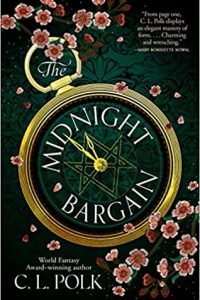Ian Mond Reviews Here Goes Nothing by Steve Toltz
 Here Goes Nothing, Steve Toltz (Melville House 978-1-61219-971-9, $27.99, 384pp, hc) May 2022.
Here Goes Nothing, Steve Toltz (Melville House 978-1-61219-971-9, $27.99, 384pp, hc) May 2022.
Here Goes Nothing, the new novel from Australian and Man Booker-nominated author Steve Toltz, is the blackest of black comedies about the end of the world and the afterlife. Our narrator, Angus Mooney, is both dead and very much alive, a somewhat surprising development, given he always believed that:
Heaven was a childish dream, Purgatory an obvious metaphor, Hell credible only on Earth, and the very notion of an immortal soul was only a way to avoid facing our imminent trip to Nowhere.
In explaining how he ended up dead (and then reborn in another world), Angus recounts his less-than-optimal upbringing, abandoned by his parents as a child, and his life of petty (and not so petty) crime accompanied by his best mate Ernie, who he met in a foster home. Everything changes for Angus when, at Ernie’s wedding, he sets eyes on Gracie, a forthright, social media-obsessed marriage celebrant. They fall in love, get married, and buy a house in the suburbs. It’s a good life, only marred by their struggle to start a family and the limited income they garner from Gracie’s job as a celebrant and Angus’s gig as a videographer. Then one morning, an old man named Owen arrives at the house. He is dying from Creutzfeldt-Jakob disease and has one last wish to live his final days in his childhood home. Out of sympathy (and the promise of a large inheritance once Owen pops his clogs), Angus and Gracie agree to let Owen move in. It’s a decision that will have horrible ramifications. Within a few months, Angus will be stuck in the afterlife, where survival is a day-to-day proposition, while a heavily pregnant Gracie will confront the emergence of a new, rapidly spreading virus with a mortality rate that puts COVID to shame.
Here Goes Nothing might be one of the most misanthropic novels I’ve read in the last several years (and that’s saying something, given how much dystopian fiction has been published since 2016). With a stygian sense of humour, Toltz persuasively argues that humanity, for all the progress made, has achieved little of substance other than finding new ways of distracting itself as the world burns. As Gracie savagely puts it toward the end of the novel:
I saw the best minds of my generation destroyed by unceasing self-regard and a dopamine-addiction feedback loop…. We married our phones and waited for the external hardware to consummate the relationship. We evolved into a distracted species when our main task was watchfulness! Our bleakest doomsayers were too optimistic. How could a species hardwired with negativity bias not see this coming? The algorithms couldn’t predict this because you can’t commodify oblivion.
Despite its pessimistic attitude, Here Goes Nothing works because we care about Angus, Grace, and Owen. It would have been easy for Toltz to depict them as caricatures; instead, they are three wonderfully flawed but sympathetic individuals. Angus might be apathetic and devoid of curiosity, but his love for Gracie and their child can’t be denied. Owen is rude and arrogant, but he’s also a lonely old man who has never enjoyed true companionship (this doesn’t excuse his cyber-stalking of Gracie, and, to be fair, neither does Toltz). As for Gracie – well, she’s blunt, self-obsessed, and obnoxious, but she’s also a truth-teller with a genuine desire to make the world a better place. A scene where Gracie live-streams her labour, forced to perform a caesarean section while asking the internet for advice, earns its shock factor and intensity because she is such a well-fleshed-out character.
Like the characters, Toltz could have fallen back on tired old jokes about identity politics, the language police, and millennials whining about ‘‘baby boomers.’’ Yes, following Angus’s death, Gracie does flame out on social media over how thin-skinned everyone has become (‘‘The whole discourse now seemed like someone’s overreaction to a hysterical response to an innocuous comment’’). For the most part, the comedy in Here Goes Nothing derives from Gracie’s warts-and-all speeches as a celebrant, the unconventional love triangle between Owen, Gracie, and Angus (where at least one of them is dead) and Toltz’s depiction of the afterlife, a bland dystopia of mundane jobs, overcrowding, acts of shocking violence, and an overriding sense that there’s no way off the hamster wheel of existence. Or, as Angus profoundly observes: the “stupor of infinity.”
Here Goes Nothing might not have anything positive to say about humanity, but it also recognises that we’re unlikely ever to change, that whether it’s Earth, the afterlife, or another dimension, “humans were the same as always: violent, loving, curious, self-interested, and made almost entirely of hope and denial.”
Ian Mond loves to talk about books. For eight years he co-hosted a book podcast, The Writer and the Critic, with Kirstyn McDermott. Recently he has revived his blog, The Hysterical Hamster, and is again posting mostly vulgar reviews on an eclectic range of literary and genre novels. You can also follow Ian on Twitter (@Mondyboy) or contact him at mondyboy74@gmail.com.
This review and more like it in the August 2022 issue of Locus.
 While you are here, please take a moment to support Locus with a one-time or recurring donation. We rely on reader donations to keep the magazine and site going, and would like to keep the site paywall free, but WE NEED YOUR FINANCIAL SUPPORT to continue quality coverage of the science fiction and fantasy field.
While you are here, please take a moment to support Locus with a one-time or recurring donation. We rely on reader donations to keep the magazine and site going, and would like to keep the site paywall free, but WE NEED YOUR FINANCIAL SUPPORT to continue quality coverage of the science fiction and fantasy field.
©Locus Magazine. Copyrighted material may not be republished without permission of LSFF.






